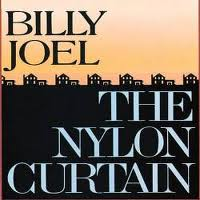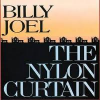 Originally published by L.S. Media. September 22nd 2012.
Originally published by L.S. Media. September 22nd 2012.
Although Billy Joel hasn’t released a hit studio album for a while, at one point his music could be heard almost everywhere. From the embryonic beginnings of M.T.V. and radio stations all over The United States of America and Europe, you couldn’t escape the talented piano player or his catchy and infectious music.
Whether it was the biting satire of his music seen in his 1989 single We Didn’t Start The Fire, the undisguised loathing of those willing to sell their souls and break their backs just to be seen to have the right car in Movin’ Out (Anthony’s Song) or the devotion to the songs he grew up with in the album An Innocent Man, Billy Joel was able to fuse social commentary with tunes that made him one of the most sought after musicians of his day.
In 1982, Billy Joel released the album The Nylon Curtain and from the off it is an album that kicks out in bitterness and unrivalled resentment that leaves the listener breathless at the compositions he puts together but also the absolute strength of character it needed to record.
The album opens with the sour tasting anger of Allentown, the usually cheerful sound of a steam driven engine hiding the emptiness and depression of a town that was dying due to it being no longer commercially viable or sustainable. The sound of the blue collar workers and their children being sold promises and dreams that will never be kept is in direct dichotomy to Billy singing that “…we’re living here in Allentown”.
The song seems to suggest that once the steel, coal and iron have gone, the union men scurry away alongside the bosses and leaving the workers in their wake, not to live in Allentown, Pennsylvania, but to decay and fester and ultimately not have a reason to get up in the morning. It is a sad indictment of the American dream and it is captured perfectly by Billy Joel. The song represents a growing disaffection with the loss of traditional work such as mining and steel production to cheaper imports at the start of the 1980’s, this disaffection wasn’t just felt in the long-established mill towns such as Pittsburgh, Allentown but in a thousand such towns and cities all across America as a new way of thinking came into play and at the expense of the blue collar employee.
The album follows this dark route faithfully throughout and it can surely be no surprise to the listener that the second song on the album, Laura is brutally explicit but somehow compelling, a love note to one who goes too far in her actions and affections. The song deals with a woman, a friend who having been on the receiving end of one disaster after another uses her friend as the emotional punch bag she needs. The narrator of this song understands what she is doing to him and he realises, in his words that he is a fool for taking every shot she has to give, the emotional poison she carries everywhere and pushes onto him. The song is bitter fuelled, aggressive and very dark for a song by Billy Joel but it is a song that very few artists could get away with recording. Either the latent anger would be taken in the wrong context and deemed to be a masochistic rant against femininity or would be seen as the mewling surrender of fate, a man who just cannot get to grips with feelings. In the end the song strikes the right balance between idealised love and determined exasperated annoyance. It gives the album a tainted edge which is needed and very enjoyable.
The Nylon Curtain stands at the very top of Billy Joel’s career due to the messages he creates for the record from the very start. The unrelenting anger of Allentown, the tainted love of Laura is a starter to what follows, Scandinavian Skies, the diary like song of life on the road in Europe, the struggle of daily living in Pressure and the unremitting splendour and expose of war in Goodnight Saigon.
This last song is possibly the most haunting on the album and it tears at the heart with its musical score and crashing piano and drum coupling. The piano almost acting as the marines going through basic training and acting as the backdrop to the stories the men are telling and the drum, played excellently by long-term cohort Liberty Devitto, becoming the sound of bullets that punctuate each man’s thoughts on the Vietnam War.
The song is very simple in its appeal; the sound of chirping crickets at the start gives way to the sound of Apocalypse Now like helicopters droning overhead. The simple things in life to keep up morale in any war, a letter from home is replaced by the image of Bob Hope entertaining the troops, are forgotten and the very real ideal of wanting to shoot the landscape with nothing more vicious or destructive than a camera, to capture the beauty of a far off land rather than the nightmare than what the Vietnam War became for the American soldiers.
Perhaps one of the lines of the song sums up the stupidity of war and aggression and how it affects the mind of every soldier is the telling line of “They left their childhood on every acre…” As London born Paul Hardcastle was to note in his own Vietnam War song, the average of the combat soldier in Vietnam was just 19. Billy Joel is alluding to that very real and damning fact. These were just children that America sent to fight and the frightening reality of that is that Governments all around the world are still asking their children to fight their battles for them.
Commercially his follow up album, An Innocent Man, could be seen as the very pinnacle of Billy Joel’s career, certainly in the amount of records it sold. It spawned seven singles and was a smash hit on both sides of the Atlantic but it doesn’t quite have the authority or dystopian charm of The Nylon Curtain, it lacks the subtle empathy needed to be, not just a great record which An Innocent Man obviously is, but to be a genuine classic, an album not just of the time but for all time.
Ian D. Hall
